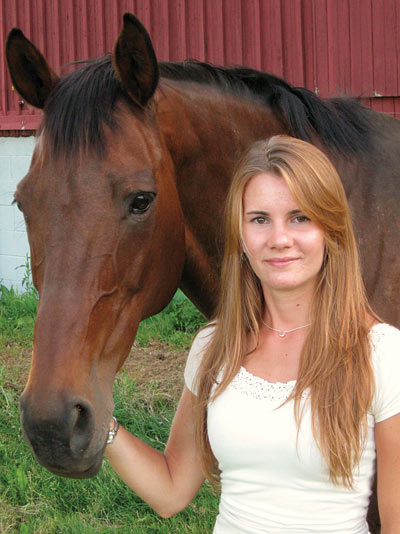 Callie King
Callie King
Callie King of Honeybrook, PA joined her personal equestrian experience with her research skills to produce a prize-winning paper for the Alltech Young Scientist Competition. King received $1,000 along with two certificates of achievement and an Alltech Young Scientist medal, topping a field of 5,000 entries. To celebrate the achievement of King and her fellow winners, Alltech hosted an award presentation during Ag Progress Days, held August 16-18 in Rock Springs, PA.
The Alltech Young Scientist Competition is held worldwide, starting on the classroom level. Students who entered the competition were required to submit a scientific paper of 3,000-5,000 words on a topic involving natural solutions to animal health challenges. Alltech Pennsylvania also hosted a local competition for the Penn State Equine Nutrition Class.
King, who graduated from Penn State in 2010 with an Associate Degree in Ag Business, prepared a research paper for the class that tied for first place. Her entry then moved on to regional competition and beyond. King was this year’s United States Undergraduate Division winner and went on to be the second place finisher in the North American competition.
King’s paper was on Glucosamine, chondroitin, hyluronic acid and their effectiveness on osteoarthritis in horses.
Personal Experience
She came up with the topic from personal experience. “I have performance horses of my own and of course I had some issues with arthritis. I thought I saw a difference, (using supplements) but I wasn’t sure if it was wishful thinking,” she said, adding that she was looking for some kind of hard evidence. “There’s so many joint supplements out there, it seems like no one really knows what works and what doesn’t.”
King wanted to see what the research really said about joint supplements. “A large number of products don’t actually have the ingredients listed in them,” she said. “The advice is to use products that are well known and have a lot of research.”
Another issue that King addressed was how the research trials evaluate horses to see if there is a real impact from the supplements. “They measure length of stride, height of stride and degree of lameness. Those are all issues that are all kind of subjective,” King said. Her paper recommends longer-term studies and comparison of radiographs over time as other ways to assess the supplements’ effectiveness. “In the research trials they try to take out as much of the subjectivity as they could but there are so many factors.”
Novice Eventer
King’s equine experiences go back all her life. “I do primarily eventing,” she said, adding that she started that sport after getting out of college and is competing at the novice level. “Before that I had done sort of everything, hunters, jumpers, distance riding. I think I found my true calling in the eventing though.”
Currently, King manages Honeybrook Stables, an equine boarding and training facility where she specializes in training young horses. She is also works selling real estate as an equine property specialist. She admits she was never fond of science when she was a student at Twin Valley High School, but found it more interesting when she got into the college study of equine science.
Three other winning papers and one video from the 21 submitted by the class included:
First Place Paper, $250 – Katie Norris, “The Use of Dietary Oils to Reduce the Risk of the Occurrence of Equine Gastric Ulcer Syndrome.”
Second Place Paper, $125- Andrew McClain, “Improving Articular Cartilage Repair through Amino Acid Supplementation in Horses Undergoing Orthopedic Surgery.”
Third Place Paper, $125- Brittany Allaband, “A Review of Dietary Treatments Aimed at Diminishing the Symptoms of Insect Bite Hypersensitivity in Horses.”
First Place Video, $50- Amanda Malecki, “The Effect of Vitamin E on the Risk of Equine Motor Neuron Disease.”
Students interested in participating in the 2011 Alltech Young Scientist Award Competition should visit www.alltechyoungscientist.com to register, review a list of suggested paper topics and submit their paper.




